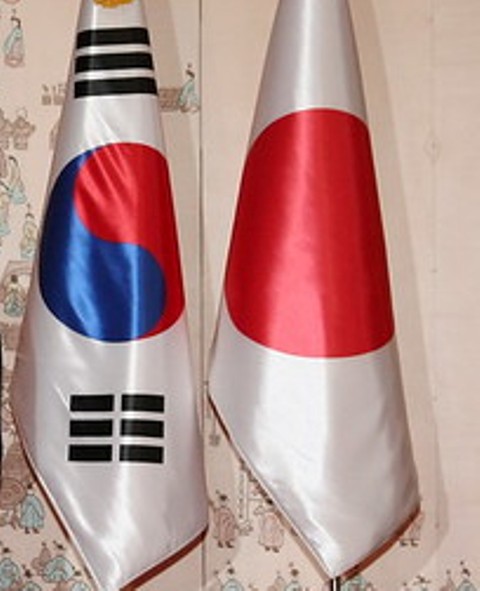UPDATE 5-Japan, South Korea raise stakes in dispute over forced labour

- Country:
- Japan
Japan and South Korea raised the stakes on Tuesday in a dispute that threatens to disrupt global supplies of smartphones and chips, with South Korea denouncing Japanese reports that it had transferred a sensitive chemical to North Korea. At the root of the diplomatic row between the two U.S. allies is compensation demanded by Seoul for South Koreans forced to work for Japanese firms during World War Two.
It worsened last week when Japan said it would tighten curbs on exports of three materials crucial for advanced consumer electronics because trust with South Korea had been broken over the forced labor dispute. The restrictions on exports of the material to South Korea could hit tech giants, such as Samsung Electronics and SK Hynix, that supply chips to the likes of Apple and Huawei.
It also underscores Japan's grip on a vital link in the global supply chain that Prime Minister Shinzo Abe's government is using as leverage, days before a parliamentary election. In some of the sharpest comments yet, South Korean Industry Minister Sung Yun-mo urged Japan to "stop making groundless claims immediately", an apparent response to a Japanese media report last week.
It quoted an unidentified senior member of Abe's Liberal Democratic Party (LDP) as saying some hydrogen fluoride exported to South Korea had ultimately been shipped to North Korea. Hydrogen fluoride, a chemical covered by the Japanese export curbs, can be used in chemical weapons. Japan has said it has seen "inappropriate instances" of South Korea's export controls but has not elaborated.
Asked about countermeasures, Sung said South Korea was reviewing "every possible plan", but gave no details. The neighbors plan to hold talks on Friday, he added.
BITTER HISTORY
The dispute stems from Japan's frustration over what it sees as South Korea's failure to act in response to a ruling by one of its courts last October ordering Japan's Nippon Steel to compensate former forced laborers. Japan says the issue of forced labor was fully settled in 1965 when the neighbors restored diplomatic relations.
The neighbors share a bitter history dating to Japan's colonization of the Korean peninsula from 1910 to 1945, which saw forced use of labor by Japanese companies and the use of "comfort women", a Japanese euphemism for girls and women, many of them Korean, forced to work in its wartime brothels. The export curbs come weeks ahead of a July 21 upper house election that Abe's Liberal Democrats and their junior partner are expected to win with a solid majority.
"Unfortunately, the election is coming," said one person familiar with the Japanese government's thinking. "The LDP will do anything to solidify their support base." Lee Young-Chae, a professor at Keisen University in Tokyo, also said politics seemed to be a factor.
"One issue that could lead to an election win seems to be rallying Abe's conservatives and consolidating swing voters by showing an anti-South Korea, a tough stance toward South Korea," Lee said. "And it seems to be working."
"WHITE LIST"
Japan on Tuesday raised the possibility of more measures against South Korea. "Whether Japan implements additional measures depends on South Korea's response," Industry Minister Hiroshige Seko told a news conference.
Japan was "not thinking at all" of withdrawing the curbs, which did not violate World Trade Organization rules, he said. South Korea raised the issue at a meeting of WTO member nations on Tuesday and will also raise it with U.S. officials in Washington, South Korean officials said.
Japan's ambassador told the WTO that there was no trade embargo, but Tokyo had carried out an operational review needed to implement export controls based on security concerns and had switched from applying "simplified" to "normal" procedures to South Korean trade. President Moon Jae-in has said South Korea could not rule out countermeasures for damage to its firms. He is due to meet executives from top conglomerates on Wednesday.
Japan threatened last week to drop South Korea from a "white list" of countries with minimum trade restrictions, which would hit supplies of a wider range of items used in weapons production. Japan's halt of preferential treatment for the three materials used in consumer electronics forces exporters to seek permission for each individual shipment to South Korea, which takes about 90 days.
(This story has not been edited by Devdiscourse staff and is auto-generated from a syndicated feed.)
ALSO READ
Britain suspends import duties on over 100 items
Japan is giving Washington 250 new cherry trees to replace those to be lost in construction work
Foreign Secretary Kwatra engages in discussions with US officials and industry executives
Foreign Secy Vinay Kwatra bolsters India-US relations on Washington visit
Defense relationship part of US-Iraq talks in Washington next week, US official says










